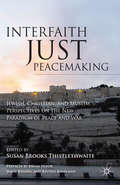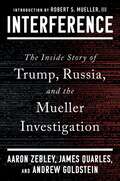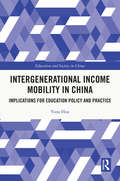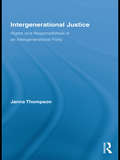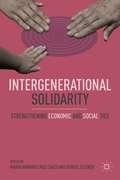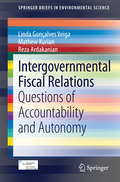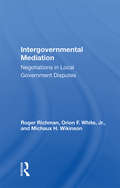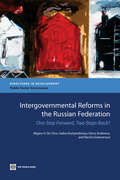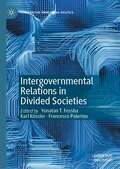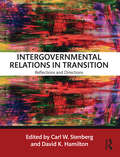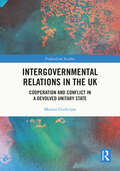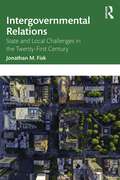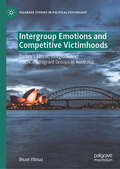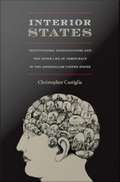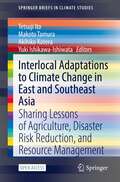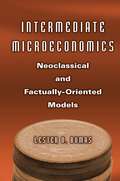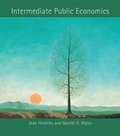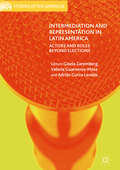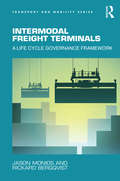- Table View
- List View
Interfaith Just Peacemaking: Jewish, Christian, and Muslim Perspectives on the New Paradigm of Peace and War
by Susan Brooks ThistlethwaiteInterfaith Just Peacemaking is a collected work by 27 Jewish, Muslim and Christian scholars and religious leaders on the ten 'practice norms' of the peacemaking paradigm called 'Just Peace. 'Just Peace theory, like the paradigm it most resembles, Just War theory, is a list of specific practices that are applied to concrete contexts.
Interference
by Kay HoneymanKate Hamilton, a Congressman’s daughter in Washington D.C., is getting what she wants by “interfering.” But Kate encounters some difficulties when her family moves to West Texas and her dad can run in a special election. None of her matchmaking efforts go according to plan. Her father’s campaign gets off to a rough start. And whenever Kate messes up, the handsome and irritatingly right Hunter Price is there to witness it. But Kate has determination and a good heart, and with all her political savvy--and a little clever interference--she’ll figure out what it takes to make Red Dirt home.
Interference (Arthur A Levine Novel Bks.)
by Kay HoneymanFriday Night Lights meets Jane Austen's Emma in this wonderful novel about a big election, big games, the big state of Texas, and a little romance.As a Congressman's daughter in Washington, D.C., Kate Hamilton is good at getting what she wants -- what some people might call "interfering." But when her family moves to West Texas so her dad can run in a special election, Kate encounters some difficulties that test all her political skills. None of her matchmaking efforts go according to plan. Her father's campaign gets off to a rough start. A pro tip for moving to Texas: Don't slam the star quarterback's hand in a door. And whenever Kate messes up, the irritatingly right (and handsome) Hunter Price is there to witness it. But Kate has determination and a good heart, and with all her political savvy -- and a little clever interference -- she'll figure out what it takes to make Red Dirt home. Terrifically funny and sweetly romantic, with whip-crack dialogue and a wise perspective on growing up, Interference is the perfect next read for fans of Jenny Han, Huntley Fitzpatrick, Elizabeth Eulberg, or Sarah Dessen.
Interference: The Inside Story of Trump, Russia, and the Mueller Investigation
by Andrew Goldstein Aaron Zebley James QuarlesThe behind-the-scenes story of the investigation that shook America to its core—the Mueller investigation that presented the evidence of Russian interference in the 2016 presidential election—as told by Robert Mueller&’s closest colleagues, including never-before-revealed details into how the team investigated Putin&’s campaign to favor candidate Donald Trump and Trump&’s efforts to interfere in the investigation. Interference is the true history of the most important and consequential decisions, obstacles, and quandaries Mueller and his team faced when investigating Russian interference in the 2016 presidential election. For the first time, Mueller&’s only deputy, his most senior counselor who served on the Watergate Special Prosecution Force, and the lead prosecutor looking into obstruction of justice and Russian interference, have come together to tell a highly relevant and readable account of what it was like to carry out their investigation of election interference, as well as any connections that existed between the Russians and members of the Trump campaign. Interference also highlights the many actions Russia took as it favored candidate Donald Trump over Hillary Clinton offering a powerful reminder of how committed Russia was to determine the outcome of the election. Ultimately, the special counsel brought indictments against thirty-four individuals and entities, including Trump&’s campaign chairman; his deputy campaign chairman; a campaign advisor; his first national security advisor; and one of Trump&’s longtime associates; as well as against Russian participants. Nearly every case that was able to proceed resulted in a guilty verdict or plea. Interference explains the motivations and actions of Russia (which has not stopped exploiting America&’s weaknesses), the importance and the limitations of a special counsel, and the need for people to make principled decisions even when being pushed from all directions not to. Much can be learned from the experiences faced by the Mueller special counsel office as it broke ground on some of the most complicated challenges facing our country—then and now. The narrative carries special relevance today, as the Supreme Court has sharply limited the conduct by a president that can be prosecuted—or even investigated.
Interfirm Networks in the Japanese Electronics Industry (The University of Sheffield/Routledge Japanese Studies Series)
by Ralph PaprzyckiInterfirm Networks in the Japanese Electronics Industry analyses changes in production networks in the Japanese electronics industry. Japan's post-war success in the assembly industries is frequently attributed to innovative approaches to the organization of production: Japanese assemblers have tended to forge intricate networks of long-term interfirm business relationships. Traditionally, these networks have been characterized by hierarchical interfirm relationships resembling a pyramid. Paprzycki argues that as a result of global industry dynamics, such monolithic 'pyramidal' production networks have come under mounting pressure and are giving way to an increasing diversity of network arrangements. A major contributing factor is the growing cost and complexity of technology, which forces even the largest manufacturers to look beyond traditional network boundaries in order to gain access to complementary (technological) assets and capabilities.
Intergenerational Income Mobility in China: Implications for Education Policy and Practice (Education and Society in China)
by Yuna HouIntergenerational income mobility is of great societal importance due to its relevance to equal socio-economic opportunity and future economic efficiency. In her book Dr Hou explores the potential role of education policy in reducing intergenerational transmission of poverty and promoting intergenerational income mobility in China. Her research investigates the extent to which intergenerational income persists in China, the mechanisms behind intergenerational inequality, and premises for policy intervention. The interaction between families, labour markets, and public policies that structure a child’s opportunities and determine the extent to which income is related to family background are discussed in detail. The book comprises of three separate empirical studies examining the relationship between parents’ income and the long-term welfare of their children for two birth cohorts; the role education plays in the intergenerational income relationship; and possible policy intervention channels to facilitate intergenerational income mobility. The lessons learnt from the empirical studies in this book offer the basis for a discussion of current educational policies and provide guidance for developing more appropriate public policies to promote intergenerational income mobility in China in the future. This book contributes to the international discussion by providing evidence in Chinese context, and also provides guidance for policymakers attempting to develop more appropriate public policies to promote intergenerational income mobility in China.
Intergenerational Justice: Rights and Responsibilities in an Intergenerational Polity (Routledge Studies in Contemporary Philosophy)
by Janna ThompsonIn this timely study, Thompson presents a theory of intergenerational justice that gives citizens duties to past and future generations, showing why people can make legitimate demands of their successors and explaining what relationships between contemporary generations count as fair. What connects these various responsibilities and entitlements is a view about individual interests that both argues that individuals are motivated by intergenerational concerns, and that a polity that appropriately recognizes these interests must support and accept intergenerational responsibilities. The book ranges over the philosophical, ethical, political and environmental questions raised by intergenerational issues: how we can have duties to non-existent people, whether we can wrong the dead or be held responsible for what they did, what sacrifices we should make for our successors, and whether we have duties to people of the remote future. Encompassing the ethical problems created by demographic change, the ethical issues of population control and intergenerational implications of new technologies for creating people, this book will be of interest to those studying philosophy, politics, legal theory, and environmental studies.
Intergenerational Solidarity
by María Amparo Cruz-Saco Sergei ZelenevThis volume analyzes intergenerational solidarity from diverse interdisciplinary angles within the social sciences. It provides analytical tools to advance research and documents how societies are adjusting to major changes that affect the core of the social fabric.
Intergovernmental Fiscal Relations
by Mathew Kurian Reza Ardakanian Linda Gonçalves VeigaThis book examines and analyzes issues related to public finance in subnational governments, along with a discussion of case studies on decentralization. Most of the analysis applies to all public goods and services provided by subnational governments, with some placed on the role of subnational governments in the management of environmental resources, notably water and waste Coverage includes optimal arrangements for sharing fiscal responsibilities among different levels of government, the potential impact of decentralization on the quality of public goods delivery, local governments' expenditure and revenue choices, and the effect of decentralization on accountability, governance and policy outcomes. The scope of discussion extends to both public finance theory and applied policy debates. The first chapter, on trends in financing of public services, opens with an explanation of the how and why of government intervention in the economy, the nature and purposes of transfers between and among governments and trends in decentralization. Case studies examine the impact of decentralization in such areas as service delivery, water and sanitation, education and health, and on poverty and income inequality. Chapter 2 examines public budgets: governance structures, norms and organizational practices, building up understanding of budgets, budget cycles, fiscal revenues from fees and taxes, expenses, debt and political economy issues, rules mandating balanced budgets in government and more. Chapter 3 discusses issues of accountability and policy outcomes, offering important lessons from recent international experience, including ways to strengthen political, administrative and financial accountability. The concluding chapter recounts lessons from recent international experience and surveys implications for the nexus approach to management of environmental resources. The information, analysis and expert advice presented here is particularly relevant for developing and emerging countries, where well designed decentralization reforms have a higher potential to improve efficiency in the provision of public services, and to enhance the development of integrated and sustainable strategies for the use of water, soil and waste resources and applications that advance the nexus approach.
Intergovernmental Mediation: Negotiations In Local Government Disputes
by Roger RichmanDisputes between government bodies are usually settled through either political bargaining or litigation, but a third method has been successfully utilized in Virginia. Since 1980, a number of municipal annexation disputes have been settled using formal mediation as a tool. The authors draw on their experiences in mediation and local government to
Intergovernmental Reforms in the Russian Federation: One Step Forward, Two Steps Back?
by Migara O. De Silva Natalia Golovanova Elena Andreeva Galina KurlyandskayaThis study is a comprehensive review of fiscal federalism in the Russian Federation. It presents a strong case for greater decentralization. By succinctly surveying the literature on fiscal decentralization and clearly spelling out the main concepts, the volume sets the stage for the subsequent description of the fiscal system in Russia and its evolution through a succession of reforms guided by a desire on the part of Russian policymakers to craft a workable system of fiscal federalism. The authors not only describe the state of fiscal federalism in Russia at its key turning points, but they also provide insightful critical assessments of the reforms introduced at each stage. The book is rich with examples, which makes it an easy and exciting reading. The book's analysis of the history gives perspective to the authors' assessment of the current state of Russia's federalism. The authors make a strong case for greater decentralization in Russia based not only on the traditional economic benefits of fiscal federalism but also on the political benefits from local government competition. The richness of detail and the careful tracing of the reforms over the past nearly two decades also mean that this study will be an invaluable guide to both current observers with academic and policy interest in the recent fiscal federalism reforms as well as Russia's fiscal evolution since the early 1990s and its current fiscal challenges.
Intergovernmental Relations in Divided Societies (Comparative Territorial Politics)
by Francesco Palermo Karl Kössler Yonatan T. FesshaThis edited volume examines the form and operation of intergovernmental relations in divided societies. Using eight country case studies, it explores the interplay between politicised ethno-cultural diversity and intergovernmental relations (IGR) in countries where the distinctive identity of at least one subnational unit is acknowledged in a form of territorial autonomy. The book examines whether and how the distinctive identity of particular subnational units and the attending competing constitutional visions shape the dynamics of IGR. The goal here is not simply to determine whether intergovernmental interactions in such societies are less cordial and more conflictual than in other societies. Such interaction in any society could be strained as a result of disagreement over specific policy objectives. The question is whether the distinctive identity of particular subnational units and the attending competing constitutional visions themselves have been a primary source of intergovernmental tension. The book also examines the impact of identity politics on institutions and instruments of IGR, determining whether the ethno-cultural divide and the tension it creates have the tendency to affect the type of institutions and instruments employed in IGR. It is also about the relevance and effectiveness of institutions and instruments of IGR in acknowledging and accommodating the distinctive identities and specific demands of subnational units, thereby contributing to the peaceful management of divided societies.
Intergovernmental Relations in Transition: Reflections and Directions
by David K. Hamilton Carl W. StenbergThe field of intergovernmental relations has changed substantially over the past five decades. It maintains a critical and evolving role in the US federal system as well as in public policy and administration. Building upon the legacy of Deil S.Wright’s scholarship, this collection of essays by distinguished scholars, emerging thought leaders, and experienced practitioners chronicles and analyzes some of the tensions and pressures that have contributed to the current state of intergovernmental relations and management. Although rarely commanding media attention by name, intergovernmental relations is being elevated in the public discourse through policy issues dominating the headlines. Many of these intergovernmental issues are addressed in this book, including health insurance exchanges under the now-threatened Affordable Care Act, and the roles of the federal, state, and local governments in food safety, energy, and climate change.Contributors interpret and assess the impacts of these and other issues on the future directions of intergovernmental relations and management. This book will serve as an ideal text for courses on intergovernmental relations and federalism, and will be of interest to government practitioners and civic and nonprofit organization leaders involved in public policy and management.
Intergovernmental Relations in the UK: Cooperation and Conflict in a Devolved Unitary State (Federalism Studies)
by Marius GuderjanIntergovernmental Relations in the UK provides a timely and up-to-date analysis of a turbulent decade in British politics and presents a fascinating case study of intergovernmental relations and territorial power in a devolved unitary state. As over time a widening range of powers has been transferred from the Westminster Parliament to the devolved legislatures in Scotland, Wales and Northern Ireland, intergovernmental relations have become increasingly important to deal with the corresponding overlaps of legislative and fiscal authority. However, leaving the European Union has exposed the weakness of the intergovernmental architecture and challenged the functionality of the UK’s multilevel polity. Until now, the question of how powerful the devolved administrations really are has not been satisfactorily answered. The author uses insights from comparative studies of federations to develop a systematic account of shared rule and intergovernmental relations. This book examines how informal institutions and practices can provide political influence beyond formal structures, with reference to an extensive range of institutions, practices, policies and political decisions. Unlike other studies focused predominantly on the state of the Union, this volume points to the interplay between conflict and cooperation, and demonstrates that the proclaimed ‘break-up of the Union’ is accompanied by efforts to integrate the different jurisdictions. This book will be of interest to scholars and postgraduate students of comparative politics, political systems, multilevel governance, regional and federal studies, British politics and public administration. It will also appeal to politicians, government advisers, civil servants and other practitioners who seek a better, more nuanced understanding of the UK’s multilevel constitution and politics, and the nature of intergovernmental relations in the UK.
Intergovernmental Relations: State and Local Challenges in the Twenty-First Century
by Jonathan M. FiskWho governs? On the surface, such a question should be easy to answer by simply reading the law. Taking a deeper examination, it is one of the most hotly contested questions, often without a clear-cut answer. With recent controversies in the United States related to confederate monuments, transgender rights, and unconventional oil and gas development, for example, the answer is: it depends and is subject to change. Intergovernmental Relations: State and Local Challenges in the Twenty-First Century examines the sources behind state-local conflict to better understand where this critical intergovernmental relationship may be breaking down, and to ultimately identify solutions and policy tools that build upon the strengths of state and local governments, mitigate conflicts, and improve the quality of life for citizens. Author Jonathan M. Fisk begins by defining the basic institutional structures and offices and addressing the intergovernmental legal environment. He then offers a framework for understanding possible sources behind state-local conflict, with a recognition that intergovernmental relationships have historical roots, are place-based, and dependent on context, before examining concrete issues that have become ensnared in intergovernmental conflict via case studies including environmental (plastic bags, climate change), social and constitutional (confederate statues, transgender bathrooms), and economic (living wage, affordable housing) to name a few. Each case study possesses its own history, intergovernmental actors, costs, benefits, opportunities, and challenges. Readers are asked to confront difficult questions about property and constitutional rights, intergenerational equity, economic growth, wage fairness, and local democracy. This book offers an ideal supplement for students enrolled in courses on public policy, federalism, state and local government, and public administration.
Intergovernmental Relations: State and Local Challenges in the Twenty-First Century
by Jonathan M. FiskWho governs? On the surface, such a question should be easy to answer by simply reading the law. Taking a deeper examination, it is one of the most hotly contested questions, often without a clear-cut answer. With recent controversies in the United States related to confederate monuments, transgender rights, and unconventional oil and gas development, for example, the answer is: it depends and is subject to change. Intergovernmental Relations: State and Local Challenges in the Twenty-First Century examines the sources behind state-local conflict to better understand where this critical intergovernmental relationship may be breaking down, and to ultimately identify solutions and policy tools that build upon the strengths of state and local governments, mitigate conflicts, and improve the quality of life for citizens. Author Jonathan M. Fisk begins by defining the basic institutional structures and offices and addressing the intergovernmental legal environment. He then offers a framework for understanding possible sources behind state-local conflict, with a recognition that intergovernmental relationships have historical roots, are place-based, and dependent on context, before examining concrete issues that have become ensnared in intergovernmental conflict via case studies including environmental (plastic bags, climate change), social and constitutional (confederate statues, transgender bathrooms), and economic (living wage, affordable housing) to name a few. Each case study possesses its own history, intergovernmental actors, costs, benefits, opportunities, and challenges. Readers are asked to confront difficult questions about property and constitutional rights, intergenerational equity, economic growth, wage fairness, and local democracy. This book offers an ideal supplement for students enrolled in courses on public policy, federalism, state and local government, and public administration.
Intergroup Emotions and Competitive Victimhoods: Turkey’s Ethnic, Religious and Political Emigrant Groups in Australia (Palgrave Studies in Political Psychology)
by Ihsan YilmazThis book examines the narratives and collective emotions of diaspora groups who originate from Turkey and now live in Australia, focusing on their experiences of collective victimhood, competitive victimhood, and intergroup emotions in relation to other diaspora groups from Turkey. Based on 122 semi-structured extensive interviews with Armenians, Kurds, Alevis, Gülenists, Kemalists and Erdoğanists, the book argues that, while in power, dominant groups driven by competitive victimhood often exhibit indifference toward the victimhood of other groups. This dynamic reflects how ressentiment can perpetuate cycles of oppression and antagonism. However, this pattern can shift when powerful groups find themselves in opposition. In such scenarios, they may become more attuned to the grievances of other groups.
Interior Freedom
by Jacques PhilippeInterior Freedom leads one to discover that even in the most difficult circumstances we possess within ourselves a space of freedom that nobody can take away, because God is its source and guarantee. Without this discovery we will always be restricted in some way and will never taste true happiness. Author Jacques Philippe develops a simple but important theme: we gain possession of our interior freedom in exact proportion to our growth in faith, hope, and love. He explains that the dynamism between these three theological virtues is the heart of the spiritual life, and he underlines the key role of the virtue of hope in our inner growth.
Interior States: Institutional Consciousness and the Inner Life of Democracy in the Antebellum United States
by Christopher CastigliaIn Interior States Christopher Castiglia focuses on U. S. citizens' democratic impulse: their ability to work with others to imagine genuinely democratic publics while taking divergent views into account. Castiglia contends that citizens of the early United States were encouraged to locate this social impulse not in associations with others but in the turbulent and conflicted interiors of their own bodies. He describes how the human interior--with its battles between appetite and restraint, desire and deferral--became a displacement of the divided sociality of nineteenth-century America's public sphere and contributed to the vanishing of that sphere in the twentieth century and the twenty-first. Drawing insightful connections between political structures, social relations, and cultural forms, he explains that as the interior came to reflect the ideological conflicts of the social world, citizens were encouraged to (mis)understand vigilant self-scrutiny and self-management as effective democratic action. In the late eighteenth century and early nineteenth, as discourses of interiority gained prominence, so did powerful counter-narratives. Castiglia reveals the flamboyant pages of antebellum popular fiction to be an archive of unruly democratic aspirations. Through close readings of works by Maria Monk and George Lippard, Walt Whitman and Timothy Shay Arthur, Hannah Webster Foster and Hannah Crafts, and Nathaniel Hawthorne and Herman Melville, Castiglia highlights a refusal to be reformed or self-contained. In antebellum authors' representations of nervousness, desire, appetite, fantasy, and imagination, he finds democratic strivings that refused to disappear. Taking inspiration from those writers and turning to the present, Castiglia advocates a humanism-without-humans that, denied the adjudicative power of interiority, promises to release democracy from its inner life and to return it to the public sphere where U. S. citizens may yet create unprecedented possibilities for social action.
Interkulturelle Räume im Spielfilm: Eine filmgeographische Analyse am Beispiel von New York City (Perspektiven der Humangeographie)
by Elisabeth Nora SommerladSpielfilme imaginieren New York City oft als eine Stadt, in der das alltägliche Zusammenleben durch interkulturelle Begegnungen konstituiert wird. Das vorliegende Buch nimmt sich diesem Topos an. Die filmgeographische Studie analysiert, wie Spielfilme interkulturelle Begegnungen inszenieren. Die Autorin erarbeitet anhand von 17 US-amerikanischen Spielfilmen, wie interkulturelle Begegnungen strategisch inszeniert werden. Hierbei hinterfragt sie kritisch die Darstellungen gesellschaftlicher Herausforderungen, welche sich im Kontext des dargebotenen Miteinanders ergeben. Das Ergebnis sind sechs vielschichtige Dimensionen interkultureller Räume. Diese offenbaren, dass NYC letztlich vor allem als Stadt kultureller Koexistenz inszeniert wird – als Projektionsfolie einer Gesellschaft, in der sich Individuen anhand diffuser kultureller Marker beständig voneinander abgrenzen. Die Studie liefert damit einen Beitrag zum mediensensiblen Diskurs über interkulturelle Fragestellungen, denen in globalisierten, kulturell diversen und medienaffinen Gesellschaften höchste Relevanz zukommt.
Interlocal Adaptations to Climate Change in East and Southeast Asia: Sharing Lessons of Agriculture, Disaster Risk Reduction, and Resource Management (SpringerBriefs in Climate Studies)
by Tetsuji Ito Makoto Tamura Akihiko Kotera Yuki Ishikawa-IshiwataThis Open Access book’s main focus is agriculture and natural resource management, disaster risk reduction, and human resource development in the countries of East and Southeast Asia and Japan.Asia is one of the regions which is the most vulnerable to the impacts of climate change. More than sixty percent of the world’s people live in the region, making it the growth center of the world. Asia is vast and includes various countries and regions, this book is focused on East and Southeast Asia including Japan. It is essential to share the knowledge and experiences for adapting climate change among these areas.In order to tackle these issues, the book aims to:Promote inter-local lessons learnt sharing climate change adaptations; "agriculture and natural resource management" and "disaster risk reduction and human resource development"Provides insights into new adaptation measures and research approaches that can consider the regional nature of Southeast AsiaShare practical adaptation options permeated by society in each country/regionThis book will be of interest to researchers and students examining climate change impacts in East and Southeast Asia.
Intermediate Microeconomics: Neoclassical and Factually-oriented Models
by Lester O. BumasThis is the first intermediate microeconomics textbook to offer both a theoretical and real-world grounding in the subject. Relying on simple algebraic equations, and developed over years of classroom testing, it covers factually oriented models in addition to the neoclassical paradigm, and goes beyond theoretical analysis to consider practical realities.
Intermediate Public Economics
by Jean Hindriks Gareth D. MylesPublic economics studies how government taxing and spending activities affect the economy--economic efficiency and the distribution of income and wealth. This comprehensive text in public economics covers the core topics market failure and taxation as well as recent developments in the political economy and public choice literatures. It is unique not only in its broad scope but in its balance between public finance and public choice and its combination of theory and relevant empirical evidence. After introducing the theory and methodology of public economics and reviewing the efficiency of the competitive equilibrium, the book presents a historical and theoretical overview of the public sector. It then discusses departures from efficiency, including imperfect competition and asymmetric information; issues in political economy, including rent-seeking (a topic often omitted from other texts); equity; taxation issues, including tax evasion and its consequences; fiscal federalism and tax competition among independent jurisdictions; and the intertemporal issues of social security and economic growth. This text introduces the reader to the theory of public economics and the most significant results of the analysis, providing an overview of the current state of the field. It is accessible to anyone with a background of intermediate microeconomics and macroeconomics and can be used in advanced undergraduate as well as graduate courses. Although the mathematics has been kept to a minimum, the book remains analytical rather than discursive. Annotated suggestions for further reading and numerous exercises are included at the end of each chapter.
Intermediation and Representation in Latin America
by Gisela Zaremberg Valeria Guarneros-Meza Adrián Gurza LavalleThis book shows how the introduction of intermediation is relevant in studying political and public policy processes, as they are increasingly accompanied by grey spaces in public and non-public arenas that cannot be categorized as purely representative or purely participative. Instead, 'hybrid' mechanisms are developing in the policy-making process, which bring in new actors who either are unelected while being required to represent or advocate for the common good of others or are directly elected but challenged by identity/rights-based issues of the people they are required to act in the best interest of. By proposing a conceptual frame on intermediation and addressing five different Latin American countries and a wide range of case studies --from human rights, labour relations, neighbourhood management, municipal bureaucracies, social accountability, to complex national systems of citizen participation--this volume shows the versatility and validity of a tridimensional frame, the "cube of political intermediation" (CPI) as a tool for analysing public policy and understanding contemporary democratic innovation in Latin America.
Intermodal Freight Terminals: A Life Cycle Governance Framework (Transport and Mobility)
by Jason Monios Rickard BergqvistMuch work has been done on port governance yet little has addressed intermodal terminal governance, despite the clear similarities. This book fills that gap by establishing a governance framework for situating analysis of intermodal terminals throughout their life cycle. A version of the product life cycle theory is amended with governance theory to produce a framework covering each stage of the terminal’s life cycle, from the initial planning to the many decisions taken regarding the public/private split in funding mechanisms, ownership, selecting an operator, specifying KPIs to the operator, setting fees, earning profit, ensuring fair access to all rail service operators, and finally to reconcessioning the terminal to a new operator, managing the handover and maintaining the terminal throughout its life cycle. An institutional analysis of stakeholder relations, situated within a governance framework, illuminates these issues and enables not only conceptualisation and greater understanding of the geography of intermodal transport, but also decision-making and goal-setting by planners and policy makers. This book thus has three functions: first, as a textbook on the planning and operation of intermodal terminals; second, as a presentation of recent empirical research on intermodal terminal governance; third, as a framework for future research in which the broad field of analysis of intermodal transport can be viewed through a single lens and used to inform geographers, policymakers and planners.
